Joan the Maid: The Battles & The Prisons (Jacques
Rivette) 1994
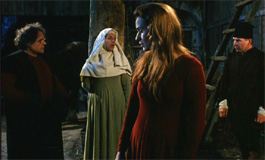 Stripped of much of the incident that one would expect from
an expansive biopic, but still remarkably satisfying, Jacques Rivette’s
two-film epic Joan The Maid: The Battles and The Prisons finds a
psychological realism that’s only enhanced by the director's unorthodox approach.
Each of these films plays well when seen next to each other, but both still
function independently. The first film, The Battles, is more concerned
with Jeanne's (Sandrine Bonnaire) faith and how her determination led the troops
to reclaim the deposed Dauphin’s crown, while the second is more concerned
with the political machinations that eventually lead to her death. The most
admirable thing about either is that they never force an interpretation of
Jeanne on us. It’s to the film’s credit that the aura of mystery created
makes her far more compelling than any definitive answers could have made her.
The movies feel a bit distanced, both physically and emotionally, but the
chaotic crises that Jeanne faces on the battlefield, in her mind, and while in
prison still pack a punch.
Stripped of much of the incident that one would expect from
an expansive biopic, but still remarkably satisfying, Jacques Rivette’s
two-film epic Joan The Maid: The Battles and The Prisons finds a
psychological realism that’s only enhanced by the director's unorthodox approach.
Each of these films plays well when seen next to each other, but both still
function independently. The first film, The Battles, is more concerned
with Jeanne's (Sandrine Bonnaire) faith and how her determination led the troops
to reclaim the deposed Dauphin’s crown, while the second is more concerned
with the political machinations that eventually lead to her death. The most
admirable thing about either is that they never force an interpretation of
Jeanne on us. It’s to the film’s credit that the aura of mystery created
makes her far more compelling than any definitive answers could have made her.
The movies feel a bit distanced, both physically and emotionally, but the
chaotic crises that Jeanne faces on the battlefield, in her mind, and while in
prison still pack a punch.
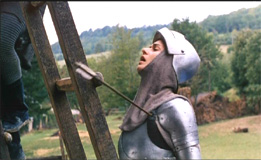 Bonnaire’s performance goes a long way toward
establishing Jeanne as a believable, conflicted person and not just someone who
seems destined for sainthood. She brings the required devout intensity to her
role, and creates a Jeanne that’s appropriately complex. Though she was in her
mid-twenties when the film was made, she is still quite girlish. The moments
where she is a bit petulant, pigheaded, and naïve make her that much more
believable when she’s firmly espousing her devotion, and when she needs to
inspire the troops to rally against impossible odds, she still seems up to the
task, moving about like a woman possessed. That she creates a complete depiction
of such a towering historical figure in spite of Rivette’s decision to remove
several key scenes in her narrative (the meeting with the Dauphin, the taking of
the cities) only further stresses the capability of the actor.
Bonnaire’s performance goes a long way toward
establishing Jeanne as a believable, conflicted person and not just someone who
seems destined for sainthood. She brings the required devout intensity to her
role, and creates a Jeanne that’s appropriately complex. Though she was in her
mid-twenties when the film was made, she is still quite girlish. The moments
where she is a bit petulant, pigheaded, and naïve make her that much more
believable when she’s firmly espousing her devotion, and when she needs to
inspire the troops to rally against impossible odds, she still seems up to the
task, moving about like a woman possessed. That she creates a complete depiction
of such a towering historical figure in spite of Rivette’s decision to remove
several key scenes in her narrative (the meeting with the Dauphin, the taking of
the cities) only further stresses the capability of the actor.
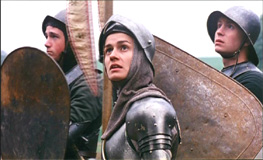 Rivette helps us to understand Jeanne in other, more
important ways, however. His production strategy places the movies in fully
realized worlds that feel entirely holistic and naturalistic. The camera glides
about observing details that most films would gloss over and as a result the
images take on a real, physical, historical weight. What’s on screen doesn’t
feel like a recreation so much as the actual event itself. The unshakable feel
of the world reminds the audience of the corporeal, underlining the disparity
between Jeanne's mortal form and her potentially divine actions. The undeniable
presence of the physical underscores how such passion is an ill fit when applied
to a mere
mortal, and reminds the audience why her actions are so exceptional. That there
are no voices from the heavens booming out casts the existence of her visions
into doubt, but simultaneously ensures that believing Jeanne when she recounts
what she’s heard from “the angels” requires genuine faith on the
audience’s part since nothing has made them cinematically “real” (whereas
everything but them is made thoroughly “real” through Rivette’s
technique). The difference between Jeanne’s very existent faith and the actual
presence of a divine hand guiding her is made apparent, and that distinction
makes the ramifications of the eventual inquisition that she faces more complex.
Rivette helps us to understand Jeanne in other, more
important ways, however. His production strategy places the movies in fully
realized worlds that feel entirely holistic and naturalistic. The camera glides
about observing details that most films would gloss over and as a result the
images take on a real, physical, historical weight. What’s on screen doesn’t
feel like a recreation so much as the actual event itself. The unshakable feel
of the world reminds the audience of the corporeal, underlining the disparity
between Jeanne's mortal form and her potentially divine actions. The undeniable
presence of the physical underscores how such passion is an ill fit when applied
to a mere
mortal, and reminds the audience why her actions are so exceptional. That there
are no voices from the heavens booming out casts the existence of her visions
into doubt, but simultaneously ensures that believing Jeanne when she recounts
what she’s heard from “the angels” requires genuine faith on the
audience’s part since nothing has made them cinematically “real” (whereas
everything but them is made thoroughly “real” through Rivette’s
technique). The difference between Jeanne’s very existent faith and the actual
presence of a divine hand guiding her is made apparent, and that distinction
makes the ramifications of the eventual inquisition that she faces more complex.
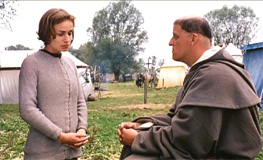 If one’s knowledge of history ensures there’s not
exactly suspense in The Battles over whether Jeanne will convince the
Dauphin of her visions so that she can help him ascend to his rightful throne,
Rivette is to be praised for keeping the scenes where she actually talks to him
off screen. With the outcome of the battle sequences being common knowledge,
they are inherently going to be less than exciting on one level because to the
audience they will seem predetermined. Rivette excises large portions of most of
them (Despite the title of the first film, it takes about 80 minutes before
combat begins. Similarly, it takes about 50 minutes before Jeanne is captured in
The Prisions.) and avoids the most important one entirely, offering an
intertitle relaying news of the troops’ success and a shot of Jeanne praying instead
of a bloodbath. This style is appropriate because the most vivid drama in the
movie comes whenever Rivette shows Jeanne praying desperately for divine
guidance. In the first film, instead of the national spectacle one might expect,
he delivers a personal one, since everything hinges on his protagonist’s
faith. He defies expectations in the second film as well, by turning his
attention to the forces that squabble over Jeanne’s fate. This approach
infuriates in the best possible way, since audience sympathy at this point lies
with Jeanne, who loses a bit of Rivette’s gaze just as she stops hearing from
the divine voices. Whenever she’s not on screen during The Prisons, she
is missed.
If one’s knowledge of history ensures there’s not
exactly suspense in The Battles over whether Jeanne will convince the
Dauphin of her visions so that she can help him ascend to his rightful throne,
Rivette is to be praised for keeping the scenes where she actually talks to him
off screen. With the outcome of the battle sequences being common knowledge,
they are inherently going to be less than exciting on one level because to the
audience they will seem predetermined. Rivette excises large portions of most of
them (Despite the title of the first film, it takes about 80 minutes before
combat begins. Similarly, it takes about 50 minutes before Jeanne is captured in
The Prisions.) and avoids the most important one entirely, offering an
intertitle relaying news of the troops’ success and a shot of Jeanne praying instead
of a bloodbath. This style is appropriate because the most vivid drama in the
movie comes whenever Rivette shows Jeanne praying desperately for divine
guidance. In the first film, instead of the national spectacle one might expect,
he delivers a personal one, since everything hinges on his protagonist’s
faith. He defies expectations in the second film as well, by turning his
attention to the forces that squabble over Jeanne’s fate. This approach
infuriates in the best possible way, since audience sympathy at this point lies
with Jeanne, who loses a bit of Rivette’s gaze just as she stops hearing from
the divine voices. Whenever she’s not on screen during The Prisons, she
is missed.
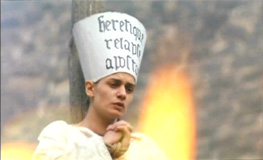 Rivette’s unique approach in The Prisons allows
him to completely avoid competing with Carl Th. Dreyer’s The Passion of
Joan of Arc, one of the great masterpieces of cinema, even though both
movies condense experience of Jeanne’s the four-month trial down to one day.
The physical and mental torture that is inflicted upon Bonnaire’s Jeanne is
less rapturous and stylized than that Dreyer’s Falconetti faces, but it’s
still damn effective in conveying the horror of her situation. Bonnaire’s
admission of fear is still tough to bear even if Rivette doesn’t attempt to
portray Jeanne’s earthly suffering as something divine. Rivette’s film feels
more honest (if perhaps a bit less amazingly overbearing) than Dreyer’s, but
that has more to do with his approach than any flaws in Passion. By this
point, because of the constant physical reminders that dominate Rivette’s
film, any corporeal punishment, including death, seems wholly terrifying. On the
flipside, the moment when Jeanne receives sacrament, and makes the ultimate
physical commitment to Christ, feels transcendent because of the same
considerations. At the end of Joan the Maid, it becomes wholly apparent
that from the start, even through his seemingly non-committal gaze, everything
Rivette has been doing has been in preparation for those realizations.
Rivette’s unique approach in The Prisons allows
him to completely avoid competing with Carl Th. Dreyer’s The Passion of
Joan of Arc, one of the great masterpieces of cinema, even though both
movies condense experience of Jeanne’s the four-month trial down to one day.
The physical and mental torture that is inflicted upon Bonnaire’s Jeanne is
less rapturous and stylized than that Dreyer’s Falconetti faces, but it’s
still damn effective in conveying the horror of her situation. Bonnaire’s
admission of fear is still tough to bear even if Rivette doesn’t attempt to
portray Jeanne’s earthly suffering as something divine. Rivette’s film feels
more honest (if perhaps a bit less amazingly overbearing) than Dreyer’s, but
that has more to do with his approach than any flaws in Passion. By this
point, because of the constant physical reminders that dominate Rivette’s
film, any corporeal punishment, including death, seems wholly terrifying. On the
flipside, the moment when Jeanne receives sacrament, and makes the ultimate
physical commitment to Christ, feels transcendent because of the same
considerations. At the end of Joan the Maid, it becomes wholly apparent
that from the start, even through his seemingly non-committal gaze, everything
Rivette has been doing has been in preparation for those realizations.
* * * * Masterpiece
10-28-02
Jeremy Heilman